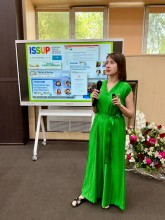On June 6, 2025, the city of Almaty, Kazakhstan, hosted the International Scientific and Practical Conference “Social Integration of Mental Health Through Innovation”, which brought together specialists from various countries to engage in dialogue on new approaches to strengthening mental health. The conference was held as part of efforts to enhance interdisciplinary and intersectoral cooperation in the field of mental health care and addiction prevention.
One of the key presentations at the conference was delivered by Nadezhda Cherchenko, PhD (c), psychiatrist at the Department of Scientific Management and Education of the Republican Scientific and Practical Center for Mental Health, and coordinator of the National Chapter of ISSUP Kazakhstan. Her talk, titled “The Multivector Threat of New Psychoactive Substances: Multidisciplinary Approaches to Diagnosis, Treatment, and Prevention”, highlighted current challenges and strategies in addressing emerging substance use trends.
As part of her presentation, Nadezhda Cherchenko provided a detailed overview of the activities of the National Chapter of ISSUP Kazakhstan (International Society of Substance Use Professionals), which since 2019 has been actively developing a professional community of specialists in the field of prevention, treatment, and rehabilitation of substance use disorders in Kazakhstan.
The main areas of work of the National Chapter include:
- Educational initiatives and professional development for specialists in the fields of addiction medicine, psychiatry, psychology, and social work;
- International collaboration and scientific research, including participation in cross-country projects and publications in peer-reviewed international journals;
- Support for the ISSUP Kazakhstan Youth Committee, which engages young professionals in the field of public health and addiction prevention;
- Work with vulnerable population groups, including people living with HIV, individuals with post-traumatic stress disorder, and members of the LGBTQ+ community.
A special focus of the presentation was placed on the growing threat posed by new psychoactive substances (NPS), which in recent years have been displacing traditional drugs on the drug scene in Central Asia. The rapid evolution of chemical formulas, challenges in detection, and the lack of standardized treatment protocols make NPS one of the key challenges for healthcare systems, law enforcement agencies, and the education sector.
As a response to these challenges, ISSUP Kazakhstan is implementing approaches based on international guidelines, including pilot projects on cognitive-behavioral therapy for users of NPS and innovative prevention campaigns targeting youth and parents.
The conference reaffirmed the need for active international collaboration, the translation of scientific evidence into practice, and the expansion of access to quality mental health services. The work of ISSUP Kazakhstan served as a vivid example of how professional communities can influence national and regional mental health strategies.


